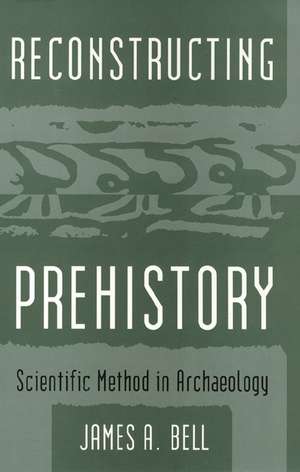Reconstructing Prehistory: Scientific Method in Archaeology
Autor James Bellen Limba Engleză Hardback – 14 iun 1994
• How can theories be formulated so that they increase understanding and provide insight, and are theories still useful when they do not?
• How can theories be adjusted when anomalies are revealed?
• How can theories be assessed against competing theories?
• When should theories be abandoned, and when should they be pursued further?
With numerous examples from archaeology as well as comparative examples from the physical and biological sciences, Bell illustrates how exploring the answers to these and related inquiries will lead to improved formulation and testing of theories.
Preț: 551.21 lei
Preț vechi: 648.13 lei
-15% Nou
Puncte Express: 827
Preț estimativ în valută:
105.47€ • 110.12$ • 87.29£
105.47€ • 110.12$ • 87.29£
Carte indisponibilă temporar
Doresc să fiu notificat când acest titlu va fi disponibil:
Se trimite...
Preluare comenzi: 021 569.72.76
Specificații
ISBN-13: 9781566391597
ISBN-10: 1566391598
Pagini: 1
Dimensiuni: 150 x 250 x 15 mm
Greutate: 0.67 kg
Editura: Temple University Press
Colecția Temple University Press
ISBN-10: 1566391598
Pagini: 1
Dimensiuni: 150 x 250 x 15 mm
Greutate: 0.67 kg
Editura: Temple University Press
Colecția Temple University Press
Notă biografică
James A. Bell is Professor of Philosophy and Chair of the Philosophy Department at the University of South Florida.
Cuprins
Preface
Introduction
Part I: The Context and the Issues
1. Controversy Over Method in Theoretical Archaeology
2. Issues in Theory Building and Assessment
3. Testability
Part II: The Philosophical and Methodological Roots
4. Induction
5. The Paradigmatic View of Science
6. The Refutationist View of Science
7. The Anarchic View of Science
Part III: Individualism and Cognitive Archaeology
8. Holism, Individualism, and Empathy
9. Cognitive Archaeology
Conclusion
Bibliography
Index
Introduction
Part I: The Context and the Issues
1. Controversy Over Method in Theoretical Archaeology
2. Issues in Theory Building and Assessment
3. Testability
Part II: The Philosophical and Methodological Roots
4. Induction
5. The Paradigmatic View of Science
6. The Refutationist View of Science
7. The Anarchic View of Science
Part III: Individualism and Cognitive Archaeology
8. Holism, Individualism, and Empathy
9. Cognitive Archaeology
Conclusion
Bibliography
Index
